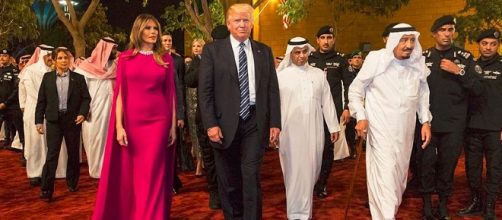President Donald Trump gave a statement on Tuesday, after his visit to the Middle East, about radical Islamism linked with the decision of the countries in the region to isolate Qatar under the charge of funding terrorism. "During my recent trip to the Middle East, I stated that there can no longer be funding of Radical Ideology. Leaders pointed to Qatar - look!" President wrote on Twitter.
Interruption of air traffic
In another tweet, he said his visit to the Middle East "has already started to pay off" by making regional leaders fulfilling their promise to confront those who fund militant groups.
On Monday, Saudi Arabia, Bahrain, the United Arab Emirates, Yemen, Egypt and the Maldives interrupted all diplomatic and trade links with Qatar who is accused of "supporting terrorism". U.S. Secretary of State Rex Tillerson promptly urged countries in the Persian Gulf to remain "united" but the president's message on Twitter actually confirmed the decision to isolate Qatar. Qatar is accused of maintaining links with al-Qaeda jihadist networks, a group of Islamic states, and Muslim brothers.
On Tuesday, air traffic to the Persian Gulf was disrupted as large Arab companies broke off flights to and from Qatar. That decision led to discontent among passengers. At least 27 flights were canceled at airports in Dubai at the time when the decision to suspend the flights of six Arab air carriers came to an end.
The Saudi Civil Aviation Administration annulled the Qatar Airways license and decided to close the company's offices for "the next 48 hours".
In Bahrain, the official BNA news agency published a similar statement stating that it will revoke the Qatar Airways license. The latter company, which flies to nine Saudi cities, has announced that it has suspended flights to the Saudi monarchy, the United Arab Emirates, Bahrain and Egypt for an indefinite period of time. The interruption of diplomatic ties follows economic measures such as the closure of land and sea borders between these countries and Qatar, the ban on the flight of Qatar companies in the airspace of these countries and restrictions on the travel of citizens.
The Worst diplomatic crisis in the Middle East
This is the worst diplomatic crisis in the Middle East in recent times. The diplomatic and economic blockade of Qatar will have short-term consequences for food imports, but exports of gas and oil from a small emirate should not suffer any greater damage. By isolating Doha, the only land route from Saudi Arabia to Qatar is an endangerment to its import of fresh food and raw materials needed for infrastructure projects worth about $ 200 billion and associated with the World Cup in 2022, analysts say.
But exports of Qatar LNG and oil that provide more than 90 percent of public revenue will not endure much damage. Qatar authorities will now "increasingly depend on maritime and air traffic, which will increase costs and inflation," Anthony Skinner warns, director of Verisk Maplecroft for the Middle East, a risk management consultancy office.


